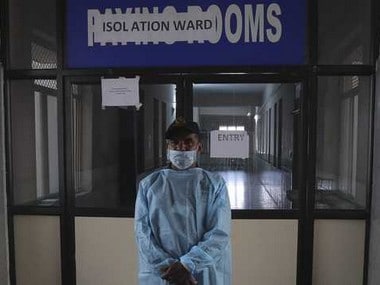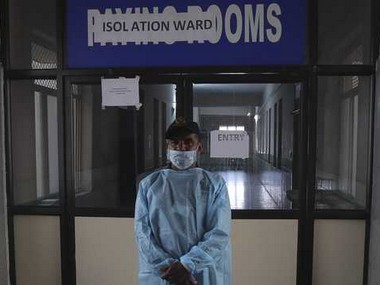According to the latest estimates, 20,471 people have tested COVID-19 positive in India so far. Of these, 15,859 are active cases, 652 people have died and remaining have recovered. Tuesday saw the greatest single-day death toll with 50 fatalities. Maharashtra remains the worst-affected state with over 5,200 cases, followed by Gujarat and Delhi. The centre passed an ordinance this afternoon to protect healthcare workers after reports from across the country have shown attacks on the health force. [caption id=“attachment_8128911” align=“alignleft” width=“380”]
 Representational image. PTI[/caption] Attacks on health professionals will attract a fine between Rs 50,000 to 5 lakhs, along with a jail term of a minimum of 6 months and up to 7 years for serious offences.
Representational image. PTI[/caption] Attacks on health professionals will attract a fine between Rs 50,000 to 5 lakhs, along with a jail term of a minimum of 6 months and up to 7 years for serious offences.
Centre-state relations simmer down after initial disagreements
Kerala had relaxed curbs in orange (where there are no or fewer new cases) and green zones (where there are no active cases) after the 20th of April. Dine-in restaurants, barbershops, intra-state public transport, certain industries within municipalities were allowed to open under certain conditions. The Centre argued that states don’t have the discretion to dilute orders issued by them. Union Home Secretary Ajay Bhalla said that the moves by the Kerala government violated the Disaster Management Act, 2005. Following this, the CM Mr Vijayan rolled back these orders and said that the state would not be in variance with the demands of the Centre. While the state has been lauded for its methodical approach to the pandemic, 19 new cases were reported on Tuesday, sparking concerns of another bout of infections. The central government had sent a team to West Bengal to assess the situation on the ground. Bengal responded angrily saying that no advance warning was given for the investigation and alleged that it had been singled out for political reasons. However, the state has now dialled down its response and shared that it will fully cooperate with the central government in tackling the pandemic.
Scientists at native CSIR develop low-cost COVID-19 test
Scientists at the Council of Scientific & Industrial Research-Institute of Genomics and Integrative Biology (CSIR-IGIB) have developed a new COVID-19 test. Those involved with the project have said that unlike the current RT-PCR test, their approach will make the use of CRISPR technology which will make testing faster (results will take around an hour) and cheaper. The team has been working on the technology for two years. It has broad applications and can be used for detecting other diseases as well. Further, since the test is visual, the scientists said that it will be easier to use and won’t require too much technical training to administer. CSIR is currently waiting for clearance from ICMR and hopes to step up manufacturing after that.
India to now procure rapid test kits from South Korea
The ICMR told states yesterday to hold off on using the rapid antibody kits that arrived last week. Some states reported that they had an accuracy rate of just 5%. Following these events, ICMR has approached a South Korean firm, SD Biosensor, for 5 lakh rapid test kits. According to sources, the firm will provide the test kits in a week. Another South Korean company will provide a further 5 lakh test kits in the coming weeks as testing requirements rise in the country. For more information, read our article on COVID Timeline . Health articles in Firstpost are written by myUpchar.com, India’s first and biggest resource for verified medical information. At myUpchar, researchers and journalists work with doctors to bring you information on all things health.
)